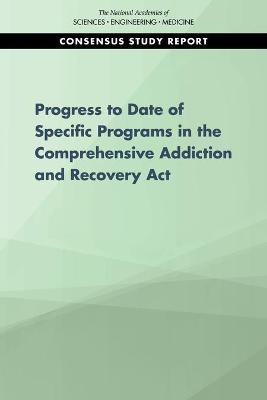
Progress of Four Programs from the Comprehensive Addiction and Recovery Act
Seiten
2021
National Academies Press (Verlag)
978-0-309-26569-0 (ISBN)
National Academies Press (Verlag)
978-0-309-26569-0 (ISBN)
Substance use disorder (SUD) and opioid use disorder are significant public health threats that affect millions of Americans each year. To help address overdose deaths and lack of access to treatment, the Comprehensive Addiction and Recovery Act (CARA) was signed into law on July 22, 2016. CARA is extensive legislation intended to address many facets of the opioid epidemic, including prevention, treatment, recovery, law enforcement, criminal justice reform, and overdose reversal. It authorizes more than $181 million each year in new funding to fight the opioid epidemic and it requires the implementation of programs and services across the United States to address SUD and recovery.
Following the passage of CARA, the Departments of Education, Health and Human Services (HHS), and Labor, along with the 2018 Related Agencies Appropriations Act, included appropriations for a study of the Substance Abuse and Mental Health Services Administration (SAMHSA) components in CARA, to be conducted by the National Academies of Sciences, Engineering, and Medicine. In response to this charge, the National Academies formed an ad hoc committee to review outcomes achieved by four programs funded by SAMHSA through CARA: State Pilot Grant Program for Treatment for Pregnant and Postpartum Women (PPW-PLT), Building Communities of Recovery (BCOR), Improving Access to Overdose Treatment (OD Treatment Access), and First Responders (FR-CARA). The committee's review is designed to result in three reports over 5 years. This report, the second in the series, reviews reported outcomes and metrics to assess progress toward achieving program goals.
Table of Contents
Front Matter
Summary
1 Introduction and Background
2 PPW-PLT and BCOR Programs
3 OD Treatment Access and FR-CARA Programs
4 Conclusions
References
Appendix A: Supplementary Program Information
Appendix B: Summary Tables of CSAT GPRA Data
Appendix C: Summary of Committee Recommendations in Report 1
Appendix D: Committee Biographical Sketches
Following the passage of CARA, the Departments of Education, Health and Human Services (HHS), and Labor, along with the 2018 Related Agencies Appropriations Act, included appropriations for a study of the Substance Abuse and Mental Health Services Administration (SAMHSA) components in CARA, to be conducted by the National Academies of Sciences, Engineering, and Medicine. In response to this charge, the National Academies formed an ad hoc committee to review outcomes achieved by four programs funded by SAMHSA through CARA: State Pilot Grant Program for Treatment for Pregnant and Postpartum Women (PPW-PLT), Building Communities of Recovery (BCOR), Improving Access to Overdose Treatment (OD Treatment Access), and First Responders (FR-CARA). The committee's review is designed to result in three reports over 5 years. This report, the second in the series, reviews reported outcomes and metrics to assess progress toward achieving program goals.
Table of Contents
Front Matter
Summary
1 Introduction and Background
2 PPW-PLT and BCOR Programs
3 OD Treatment Access and FR-CARA Programs
4 Conclusions
References
Appendix A: Supplementary Program Information
Appendix B: Summary Tables of CSAT GPRA Data
Appendix C: Summary of Committee Recommendations in Report 1
Appendix D: Committee Biographical Sketches
| Erscheinungsdatum | 26.03.2021 |
|---|---|
| Verlagsort | Washington |
| Sprache | englisch |
| Maße | 216 x 279 mm |
| Themenwelt | Studium ► Querschnittsbereiche ► Prävention / Gesundheitsförderung |
| ISBN-10 | 0-309-26569-X / 030926569X |
| ISBN-13 | 978-0-309-26569-0 / 9780309265690 |
| Zustand | Neuware |
| Haben Sie eine Frage zum Produkt? |
Mehr entdecken
aus dem Bereich
aus dem Bereich
das Manual zur psychologischen Gesundheitsförderung
Buch | Hardcover (2023)
Springer Berlin (Verlag)
39,99 €
Orthomolekulare Medizin in Prävention, Diagnostik und Therapie
Buch | Hardcover (2022)
Thieme (Verlag)
71,00 €


